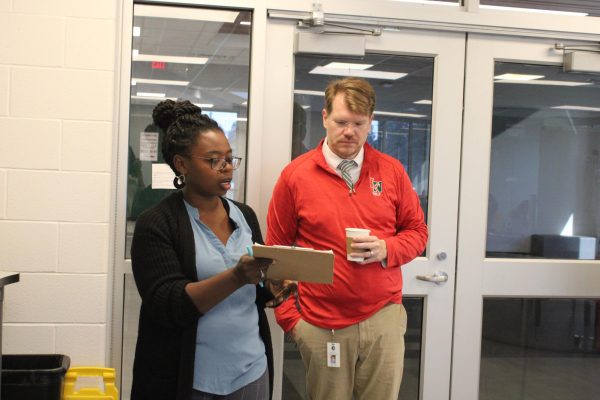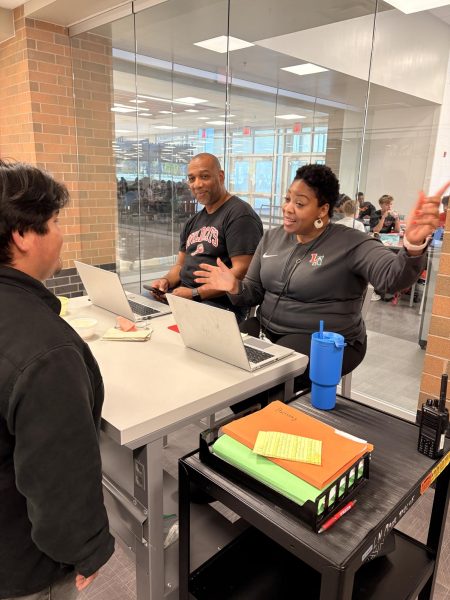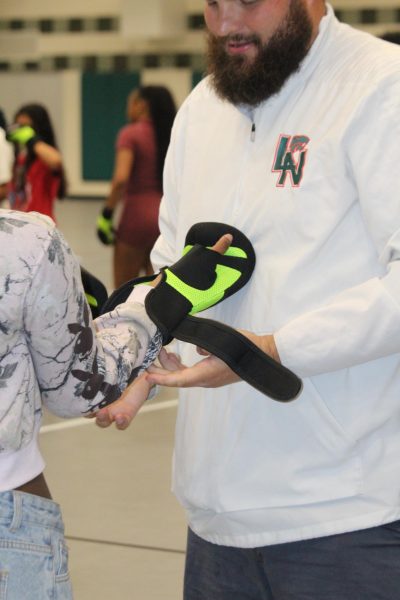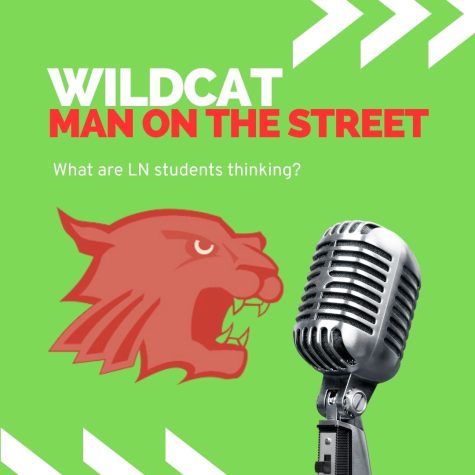Facing the immigration issue
Profile in strength: Junior Jerry Rojas poses for a profile picture. Rojas was born in the U.S. but his parents are immigrants from Mexico.
Immigration has become a big issue in the United States since the election of President Trump in 2016. When Trump was running for office, one of his made platforms was dealing with immigration issues. He has upheld his promise since taking office, but his methods of dealing with immigration have left many around the country uncertain. His proposed policies include deporting immigrants and their children even if the children were born in the US and are US citizens. This policy affects many LN students including junior Jerry Rojas who was born in the US after his parents immigrated here from Mexico.
“I feel like he’s just doing that for attention and for all the people that are able to vote. He’s doing that to get more support from the people that are able to participate in the election. I don’t think that’s possible for him to do that because that’s a lot of kids that are citizens of the country. I would feel bad if that happened out of nowhere because a lot of parents would be like ‘how is that even possible to take kids’ citizenship’,” Rojas said.
Trump wants to deport all immigrants whether they are documented or not. He also wants to close US borders to refugees. This will affect the migrant caravan of immigrants walking from Central America to the Mexico-US border in hopes for a better future. Rojas knows the struggles they have gone through based on his visits to Mexico. Mexico is going through similar issues as countries in Central America, like Honduras, Guatemala, and El Salvador. He believes these people are coming to America for similar reasons as his parents, to gain a better future for themselves and their children.
“There are a lot of gangs in the streets and the government doesn’t really have control of anything. When [my parents] worked they didn’t get enough money to live. They were planning on having kids, and they wanted a better future for me and my siblings, so they left,” Rojas said.
Trump does not want these people to come to America because he believes that America does not have enough resources to support them. They will need health care, jobs, education, and many other things to help them get on their feet. Though Rojas was born here, he does remember the struggles his parents went through trying to gain these things with the limit of available resources.
“When I was growing up, I remember when we would out places they were not able to understand other people since no one could translate to them. They had to have two jobs sometimes because raising three kids takes money,” Rojas said.
Rojas’ parents wanted to raise a family, but they knew that they would not have enough money to provide for them. They, like many others, decide to come to America in hopes that they could not only provide for their kids, but also to give them opportunities that they would not have in Mexico.
“They knew if we wanted to go to college or something, we wouldn’t be able to in Mexico because there aren’t a lot of jobs where you make enough money to afford college. They knew that there were more opportunities here for them to be able to work and get paid,” Rojas said.
Senior Oscar Gonzalez’s parents came to America for similar reasons when he was just 3 years old. Though he doesn’t remember what it was like to come over the first time, he does remember the tension of the whole process for not only his family, but other families when he returned from a visit to Mexico at 8 years old.
“It was a long and stressful time for not only other people coming across, but also for my family because everyone is just pressured with what could happen. It could go really well or really bad so there was just that feeling of tension throughout the entire journey,” Gonzalez said.
Facing challenges:
Once families reach America, they are faced with new challenges as they adjust to the new environment. Rojas’ parents experienced these difficulties as they tried to learn a new language and find jobs to provide for their family in order to thrive in the US.
“They didn’t know the language so it was difficult at first for them to communicate with people around them. At first they didn’t have jobs, but some of my family members already had jobs here so they got them jobs where they worked,” Rojas said.
While language is often a barrier for immigrants when they first move here from foreign countries, most learn to speak English very quickly. According to the American Immigration Council, three out of four immigrants in Indiana speak English well. This is due in part to the programs offered in Indianapolis area and in the schools to teach English to immigrants. ENL teacher Natalie Rosario helps students at LN adjust to the changes by teaching them English as well as new cultural aspects in Indiana.
“In ENL classes, we give the students access to survival vocabulary and academic vocabulary. We develop listening, reading, writing, and speaking skills. We talk a little bit about the United States, what school is like, and attendance. We also to a lot of get to know you activities and team building activities, so the kids understand that they are not alone,” Rosario said.
Many of Rosario’s students are unfamiliar with how to do certain daily tasks need for school. She helps them adjust by teaching them how to do these tasks, such as using technology.
“Some kids are familiar with technology. Some are not because they didn’t have access to that technology in their country. We help them with finding their locker, how to open their lockers, knowing when they have their classes, how to log into your chromebook, how do you find the resources you need to study, [and] how to navigate the cafeteria, ” Rosario said.
Immigrant students also benefit from programs such as DACA. Senior Vanessa Gomez is spreading awareness of the benefits available such as the ability to get jobs, driver’s licenses, and financial aid for college. She is working alongside the Dream team at LN and the workers from La Plaza, a Central Indiana organization that works to help Latino students get educational benefits, to help these students get the benefits they need in order to succeed.
“I know many students benefit from this and their life depends on that. I wanted to make sure that people were informed about the program,” Gomez said.
According to a census take in 2015, documented immigrants make up 13.5 percent of the U.S. population. In 2014, there were 11.1 million unauthorized immigrants living in the US. In 2015, the US accepted 70,000 refugees. Currently, there are thousand of migrants walking from Central America to the US in hopes of escaping from the current situations in their countries. Gonzalez has witnessed the corrupt governments and economic systems that have caused the countries to be filled with violence.
“Pretty much everything is different. It is a lot more culture based, everything in still living in the roots of its past really. It is also really different government wise and economy wise. Over there, you see a lot more violence. The chances of that happening are a lot higher, so you’ll run into it in the streets,” Gonzalez said.
In addition to the problems in their countries, immigrants suffer from a number of different problems once they transition from their home country to America. Students have to adjust to living with people that they may not have seen in years because they moved to America when they were little. Rosario has witnessed students struggle as they try to deal with how to live with their new families.
“Sometimes their parents move to the US and leave the kids behind when they are young. During that time the parents just work a lot and try to get settled and then later they send for their kids. We do have a lot of situations where they students are meeting the parents for the first time in like 10 years, so that’s a huge transition. The kids come into a new family that they don’t know, so that is really hard to deal with,” Rosario said.
Students also often have to deal with leaving people behind that they grew up with, some of whom are old and sick. Rosario has seen her students struggle through their emotions as they deal with being away from these people.
“We see a lot students that are going through a lot. I see kids that have left their families behind. A lot of times it’s their grandparents and the grandparents are old and ill, so they are worried about their grandparents but they can’t visit them. So with situations like that we try to create a safe space within our school where the kids can go and talk about any feelings they may have, Rosario said.
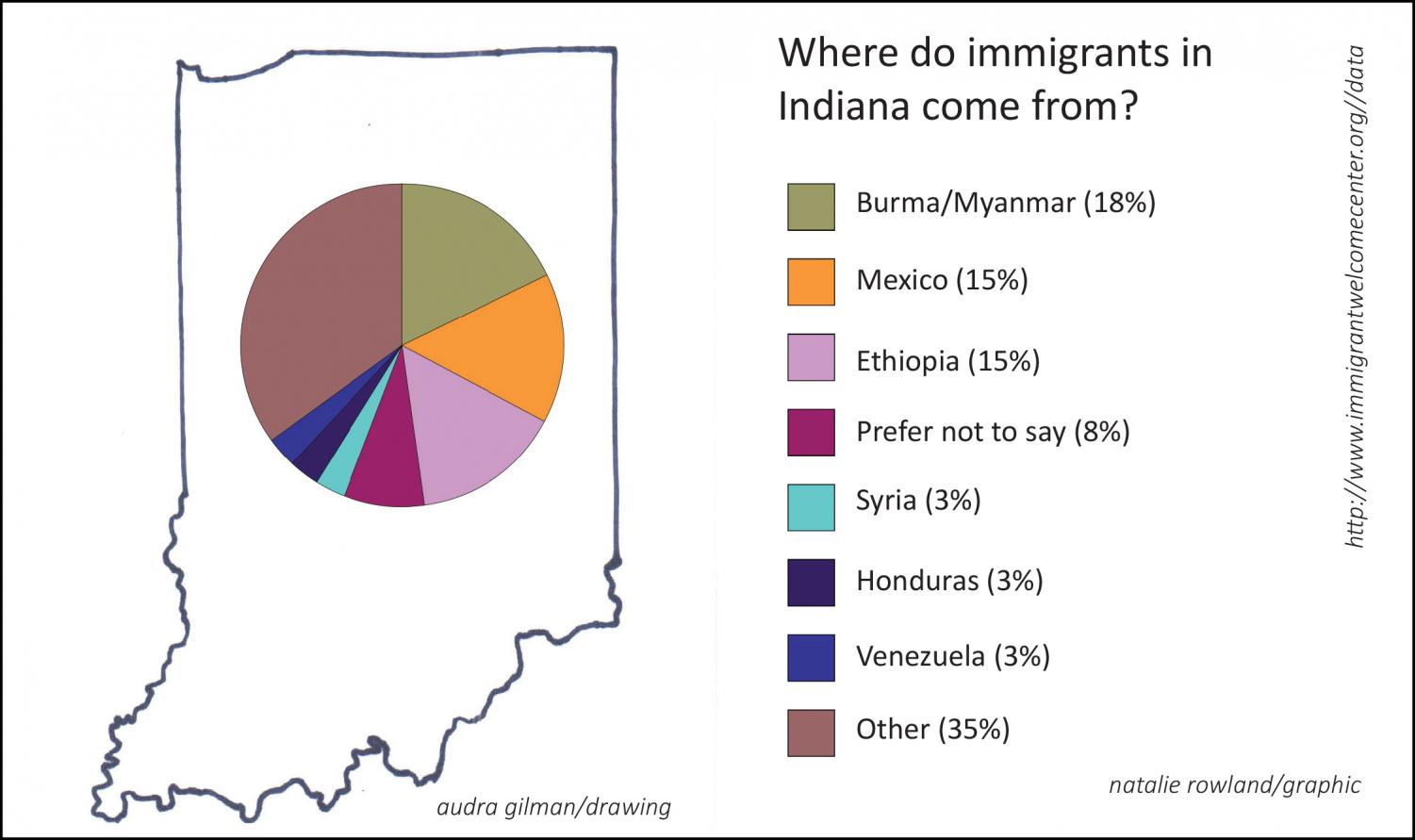
Raising awareness:
Despite the increased presence of immigrants and refugees in the US over the last few years, many people still go uninformed about recent issues with immigration in the US. Senior Cora Greiwe has witnessed the problems in these countries through living with her parents in Turkey, when they were missionaries. She is helping to raise more of this awareness of these issues through an essay she wrote for IU’s Wells Scholarship.
“I have a deep connection with the community and culture in Turkey and all the recent issues with immigration made me want to bring it to light because I feel like a lot of people are misinformed on this topic,” Greiwe said.
Through Greiwe’s experiences in Turkey along with her connection with the community, she has gained a different view of the situation. She believes this aided her in writing her essay as opposed to just the knowledge that everyone has through watching the news.
“I feel like my personal experiences gave me a different view. I was writing from the perspective of someone who has actually had experience over there as oppose to someone who has just seen things on the news,” Greiwe said.
Greiwe has noticed the increased misconceptions among Americans on immigrants over the last few years. She hopes that her essay will help change their opinions and allow them to be more open to immigrants.
“It bothers me when people say things that are false. I value truth and I feel like because I do know alot about this topic I can inform them and help them be kinder and more accepting,” Greiwe said.
Gomez has been able to hear the opinions of people on both sides of the immigration issues through her work with La Plaza and also the DACA program. She has learned a lot through her interactions with these people and programs.
“I learned a lot of things from different people, like the recipients and people who don’t support the program, and just understood why they think that and their opinions,” Gomez said.
Gonzalez shares similar feelings about how people perceive immigrants. He believes that the news often just highlights the negative aspects related to immigrants and overlooks the positive contribution they are making to the community.
“I feel like most people look past that and just say, ‘They’re criminals. They’re trying to take our money and jobs’, but we come here and we’re playing our part as well. We’re paying our taxes and our bills. We’re giving to the community and contributing to the economy. I feel like that’s something people overlook or don’t pay attention to,” Gonzalez said.
Rosario believes that people don’t understand how difficult it is for a family to dig up roots of their home and move to a place that is financially different than back home. She thinks that LN is lucky to have programs to support these students and to help them through this tough process.
“Moving here from another country is expensive. A lot of times students come in because a family member opens their doors and offers them hospitality. They stay there for a while until the family can get on their feet and find their own place. There are other expenses, like having what they need to face winter. In our school we’ve been blessed because we’ve had kids in the past that have collected items to support new students. Other families can just afford it because they come here for different reasons. Some people can afford to make this transition smoothly and for other people, it is more difficult. It just depends on the circumstances. Circumstances mark how they navigate in this new setting,” Rosario said.
Gonzalez hopes that people all around the country will begin to recognize the contributions immigrants make. He believes this would create a better environment to live in for everyone.
“I’d like to have a bigger spotlight on immigrants from anywhere. I feel like the country would be a better place if everyone was united not just on certain days, but everyday. Day after day,” Gonzalez said.
Rojas hopes that people will begin to understand everything that immigrants go through and their motivations for coming here. He hopes that this awareness will change their view on immigrants.
“I wish that people understood that immigrants don’t just come here to take people’s jobs or to take advantage of them. They come here for a better future not just for them, but for their kids because of the opportunities that are here,” Rojas said.







